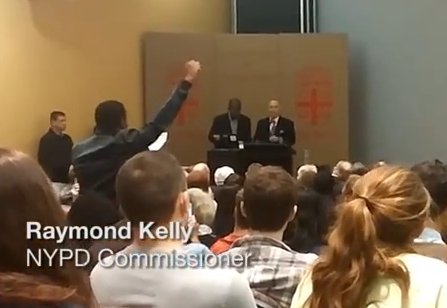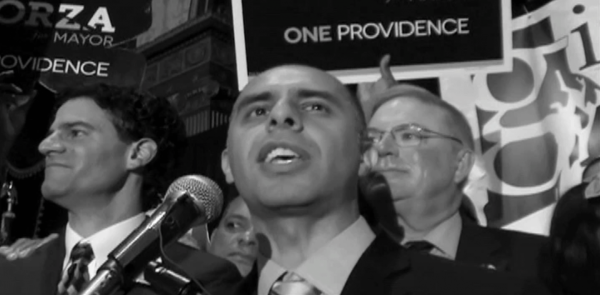 As I watch news of Providence Mayor Jorge Elorza’s administration, I see more and more of what many feared during the campaign: an Elorza–Brett Smiley led administration, beholden to the moneyed, white interests of the East Side, at the expense of the rest of the city. Today in the Providence Journal, there was front-page coverage of a meeting at Nathan Bishop Middle School on the East Side, where residents expressed “alarm” at an alleged wave of home break-ins in their neighborhood.
As I watch news of Providence Mayor Jorge Elorza’s administration, I see more and more of what many feared during the campaign: an Elorza–Brett Smiley led administration, beholden to the moneyed, white interests of the East Side, at the expense of the rest of the city. Today in the Providence Journal, there was front-page coverage of a meeting at Nathan Bishop Middle School on the East Side, where residents expressed “alarm” at an alleged wave of home break-ins in their neighborhood.
Certainly break-ins are never a good thing, on any side of town. But the mayor said “One Providence,” not two.
The swift response from the mayor, police, and media to these mostly white, relatively affluent city dwellers highlights the opposite experience of Southside community organizations, residents, and organizers seeking the mayor’s audience for their issues. At the sounds of alarm raised by those on the East Side, Mayor Elorza rushed to a community meeting and brought along high-ranking police officials. All this despite police statistics (cited in the Projo article) demonstrating a decrease in reported break-ins on the East Side since last year. The Providence Journal followed close behind and gave the meeting front-page coverage! This comes a day after I received an email from the administration, announcing the new “Center for City Services,” based on the pledge that “everyone who lives, works, owns a business, and goes to school in Providence deserves the highest quality city services.” “Everyone,” not just the politically palatable or otherwise privileged.
The Tenant and Homeowner Association (THA), a group of working-class homeowners and renters from across Providence, predominantly people of color, who are organized to prevent foreclosure, evictions, and the abandonment of their neighborhoods, have been raising the “alarm” about the city’s hundreds of abandoned properties for months, and have yet to receive face time with the mayor.
In fact, a formal request for a meeting was met with months of silence, and only after further prodding finally received the answer from a staffer that the mayor was simply “too busy,” to meet on this issue. Yet, these East Side residents, alarmed at break-ins that have not, in fact, increased, receive the mayor’s immediate presence in their neighborhood, along with city resources in the form of eager police commanders. While break-ins appear a bit of a straw man, abandoned properties, by the mayor’s own admission, are a serious problem for the city, though not on the East Side. Hundreds of properties sit empty, inviting arson, blighting neighborhoods, and dragging down property values for those homeowners, predominantly people of color, who have managed to hang on to their homes amidst foreclosures and structural unemployment.
The mayor’s reluctance to meet with a group of affected residents, who have actually been organizing themselves around an issue for years (the last six of which were spent changing state law to protect vulnerable renters from eviction), is unacceptable. Suspicions about his priorities and the sincerity of “One Providence,” are legitimized by his earnest response to East Side residents, who are unorganized and whose “alarm” is rooted in race and class-based fear.
Instead of assuaging the fears of East Siders, perhaps the mayor should prioritize the basic needs of the many residents in the rest of Providence, whose resistance to never-ending poverty, divestment, blight, and disenfranchisement are rooted in real problems, like abandoned properties, to which the mayor himself offered lip service in the pursuit of votes.
]]>
I admit, I had to look up the “millennial generation” to determine whether I fit in. A brief search reveals that the grouping is wide (1982-2000 give or take), and not clearly defined by a monolithic shared experience. We millennials certainly do not have the hefty experience of World War II to bind us, nor do we have the post-war upheavals in this country and the formerly colonized world in the 1960s and 70s, largely curtailed by counter forces (police and military efforts, the introduction of crack and subsequent drug war, cultural shifts towards capitalist materialism) by the time we were born. One could argue we all arrived at adulthood in the age of September 11th and the subsequent “war on terror.” Others argue that we “boomerang” back in with our parents after college due to few job opportunities, stagnant wages, rising costs, and our alleged laziness. A compelling event, movement, change, or war has yet to be offered to unify our so-called generation.
I find it hard to imagine that I have enough in common with someone born in the mid-1990s to constitute any sort of serious bond, but I will acknowledge, as politicians do time and again to win elections, we shall inherent our world – this country and especially the cities most of us live in. The new mayor of Providence, being relatively young himself, and a son of Guatemalan immigrants (appealing to millennials’ alleged open-mindedness about race) has taken his place in a line of political descendants of Obama looking to cash in on our political allegiance. I was in fact prompted to look into my generational coding after hearing of the mayor’s “Millennial Task Force,” a group of young professionals, selected as ambassadors of the administration to city residents from their generation. I decided to see what the “Force,” and the mayor’s administration, had on offer for those of us who will inherit this city.
Being a community organizer in Providence for the last four years made me skeptical of any promises or policies coming from Mayor Elorza and his team. From curbing police overreach, harassment, and violence, to affordable housing provision, and reversing trends towards gentrification, especially in the mayor’s old neighborhood, the West End, Elorza’s campaign and early administration failed to impress. Indeed, many of the long-time Providence residents with whom I organize vocally criticized what they saw as a campaign run by and for the affluent, predominantly white, East Side. Especially following the transmutation of the separate Brett Smiley and Elorza campaigns into one, proclaimed as the only way to defeat former mayor Buddy Cianci, city dwellers on the other side of route 95 saw a power grab that would not be to their benefit.
Besides a commitment to the “arts,” very loosely defined, Elorza’s major policy initiatives since taking office have been: a streetcar line running between Brown University, downtown and the hospitals in Upper South Providence, tax break agreements for developers looking to build and operate in the vacant land formerly occupied by route 195, and a receivership program, touted as a way to clean up and occupy all 500 or so vacant, nuisance properties dotting the city.
Arts festivals and so-called “development through the arts” appeal to many millennials as a public subsidy for their chosen careers – self-employment as consultants, entrepreneurs, and artists. These “careers” were originally subsidized by parents with financial means, degrees from preeminent colleges (of which RISD and Brown University are examples), and the privileges of being young and most often white. Now, there are indeed many young artists, largely of color, who grew up in this city, who participate in dynamic arts organizations based in the city and who have stories to tell and work to showcase that truly do represent Providence. Yet, the question lingers – who will benefit from the mayor’s commitment to arts development? From my experience at the Millennial Task Force’s open house in July, the field seems dominated by transplants brought to the city by Brown or RISD who have “decided” to make Providence their home and playground. Like Mayor Elorza himself claims to be, there are quite enough dynamic, artistic and incredible young people born and raised here. The mayor’s policies leave them with a choice between competing with transplants and the disproportionate credit and opportunity granted them by city hall, or pursuing their futures outside of Providence.
The streetcar proposal, the promotional materials for which claim to “attract 1,500 new city residents over 20 years,” was the topic of much gushing at the Millennial get together. I heard things as superficial as a streetcar is simply more “glamorous” than a bus, to even more suspicious claims that the streetcar could “unite different neighborhoods” across Providence. Superficiality dominated when it came to the ideas scrawled on stickies and posted to the boards around the room, with ideas like more gyms, a downtown grocery store, better lighting on downtown streets, and tiny houses. Not only are these ideas superficial and disconnected from the political-economic reality of most of the city’s residents, they are also extremely self-centered. The gyms are designed to feed the exercise culture of the young professional class, not make the city population in general healthier (plenty of poor people from around the city already hit Planet Fitness and seem to be doing fine there). The downtown grocery store is for the convenience of that tiny sliver of the population who can afford to live in downtown’s luxury and exorbitantly priced lofts and apartments. Lighting in the area is for those same young professionals’ running routes, and hints at the underlying race and class-based fear of criminal elements. Tiny houses are only for those who have the privilege to choose the type of house they’d like to live in; I heard little to nothing about those with no shelter at all. Are these “tiny houses” for them? Shouldn’t they have access to regular-sized houses?
Besides a commitment to “glamor” over policies and projects that would address material inequities in housing, policing, wealth, and transportation, we have the suspicious undercurrent of a desire to “unite” Providence’s different neighborhoods. Elorza indeed ran under the banner of “One Providence.” But we have never been “One Providence.” Since the city’s inception, through slave trading and race riots, to neoliberal development projects that subsidize the profiteering of wealthy developers, there has always been many Providences. For those millennials I heard saying they want to learn more about those newly discovered neighborhoods not on the East Side, I say, where you buy your over-priced groceries used to be the Cape Verdean and African-American part of town. Perhaps a history lesson, rather than a streetcar, would help you connect without ever having to leave the comfort of College Hill. If one rode RIPTA, despite its lack of glamor, they would see the homage to Snowtown and Hard Scrabble on the bus shelter in front of University Plaza. One has to question how and why these millennials want to “unite” neighborhoods, or “connect” with people in other parts of town? Without a deep historical and political understanding of what has driven change in every Providence neighborhood, and a commitment to those unglamorous political and economic realities that drive neighborhoods and potential neighbors apart, I would encourage people to stay right where they are.
Never in all of the pandering for the streetcar did I hear mention of its cost, until someone asked, condescendingly, “well, what else should they do with that money?”(over 100 million initially and over 3 million annually for operations). When I responded, “they could support affordable housing,” the retort was even more patronizing. “Well they’re not going to do that.” It is as if the political imaginations of members of the generation anointed to inherit the city begin and end with the platforms of slick, compradore politicians like Obama and Elorza, who tout their backgrounds and wave glamorous slogans and promises, along with a “pass” on racism in exchange for some cheerleading and a vote. My response to that millennial debutante is that they’re not “going to do that” because people like you will drink the Kool-Aid and get on the streetcar to nowhere, all the while shaking hands and agreeing with suits in city hall hoping for that city job in the office of Sustainability.
I went to this open house hoping to hear the analysis, vision, and yes, criticisms, of those in my so-called generation. Instead, I was confronted with a gaggle of yes men and careerists, who apparently had not been confronted with the political realities of Elorza’s trickle-down economic policies or his dismissal of structural racism in policing, housing, and transportation in the city and state. Or, if they had directly experienced the realities of these things, saw their only way out as pandering to a machine like the Elorza administration. Admittedly, some of these young people see rising through the ranks and following in Elorza’s steps as a means to raise up their whole communities; a noble and honest naivete I cannot ascribe to many of the other, predominantly white Brown and RISD grads in the room.
To those like the pithy stranger who wanted me to accept the profiteering and tired politics of men like Elorza and those “networking” the room for a cushy job, I say – please, respond to this polemic, try and defend your positions and ambitions, and watch as your edifice falls. To those genuinely interested in the better living of everyone in Providence, the city’s children, who have lived the brutal realities of policies like Elorza’s for two decades or more – organize, learn from your own and others’ experiences, join the fights being waged by experienced, committed organizers and organizations in this city. Refuse to limit yourselves to success as defined by Elorza and his “healthy gentrification” ideology sanctioned by Harvard Law School.
In the past, millenarian social movements against colonialism would struggle under the spiritual banner of a new coming, an apocalypse or sea change in the way of things. Let’s be a generation more like our millenarian forebears, who labored under domination, but dared to dream so far beyond the borders of their colonizers’ imaginations, that they tore the world open, and wrought a new one, with nothing but their hearts, dreams, and commitment to each other.
]]>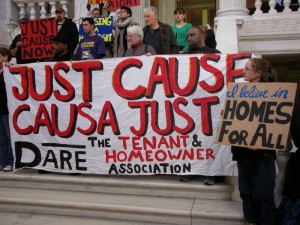 Crying the need to ease the burdens of doing business in Rhode Island, the House of Representatives recently passed a budget that lowers the corporate tax rate, raises the ceiling on the estate tax, pays millions to 38 Studios bond investors, raises the gas tax and the cost of a car inspection. One has to wonder how these easements will truly help businesses in Rhode Island, or lure others here, when the state’s consumers are forced deeper into poverty.
Crying the need to ease the burdens of doing business in Rhode Island, the House of Representatives recently passed a budget that lowers the corporate tax rate, raises the ceiling on the estate tax, pays millions to 38 Studios bond investors, raises the gas tax and the cost of a car inspection. One has to wonder how these easements will truly help businesses in Rhode Island, or lure others here, when the state’s consumers are forced deeper into poverty.
Along with raising the costs of living and depleting our tax revenue, the House, led by new Speaker Nicholas Mattiello, may literally enable the eviction of hundreds of Rhode Island’s renters by shelving important legislation.
Just Cause (H7449 and S2659), is a bill that would prevent the no-fault eviction of tenants whose landlords get foreclosed on by the bank. As housing costs rise, homeownership remains what it has always been – the American “dream,” never reality – unemployment refuses to abate, and banks continue to foreclose on homes, the threat of no-fault eviction looms over many Rhode Island families.
“Just Cause,” the informal title of the bill, refers to the state’s Landlord-Tenant Act, which describes “just causes” for eviction. The list does not include foreclosure. However, throughout the housing crisis banks have used foreclosure as a justification to evict hundreds of families from their apartments. The rationale for this, they allege, is that homes are easier to sell without occupants. One has to wonder at this claim, when a simple drive down through many parts of the state includes the shells of abandoned, vandalized, and near-worthless homes, owned by banks that foreclosed and evicted the residents. These homes are not easy to sell. In fact, the only people who will buy them are out of state investors, slumlords looking to mooch rent from Rhode Island families in exchange for criminal living conditions, and house flippers, who profit from crisis by buying cheap properties.
According to The National Low Income Housing Coalition, housing costs are already out of reach for many Rhode Island renters. In order to afford the fair market rent for a 2-bedroom apartment ($928 a month), a renter making the average wage ($11.92 an hour), would have to work 60 hours a week, 52 weeks a year. There aren’t a lot of people I know making the “average wage,” which must factor in wages lower and much higher than 12 bucks an hour. With the minimum wage at 8.oo dollars an hour, one has to wonder how many working Rhode Islanders pay their rent. Add to this the 1,468 foreclosure deeds filed in 2013 and you have a rental crisis, as tenants evicted because of foreclosure drive up the demand on scarce and unaffordable rentals. In addition, those vacant, foreclosed properties stand empty, occasionally burning down, dragging down surrounding property values and further exacerbating the homeless and housing issues of our state.
No fault evictions due to foreclosure are increasing homelessness, reducing the availability of homes, pushing up rents, and fueling a housing crisis. It’s immoral and bad for the economy to allow banks to put families out, especially when they’ve done nothing wrong and are able to pay rent. Why would Speaker Mattiello, the primary opponent of the legislation, prefer a vacant home, homeless family, and devastated neighborhoods to a property occupied by tenants who pay rent and maintain the building? Even while the Senate leadership, through the efforts Senator Harold Metts, shepherds the bill towards passage, Speaker Mattiello remains adamantly in support of an international banking industry in opposition to the state’s people and economy.
It’s time to question the ideology that subsidies for the rich and corporations produce economic prosperity. It’s time for the state’s government to utilize regulations like Just Cause to bolster a struggling economy (at no cost to the state!), and protect the interests of the majority of the state’s people.
It’s time for Speaker Mattiello to reconsider the cost of shelving this legislation.
]]>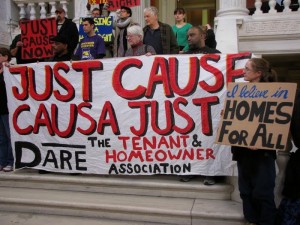 For the past five years, a group of dedicated residents, most of whom are currently fighting foreclosure and eviction from their homes, have campaigned to make banks accountable to Rhode Island Landlord-Tenant law. Currently, banks that take over property make it a practice to evict the tenants who are living there, regardless of whether there is any “just cause” to do so. The RI Landlord-Tenant Act does not permit any other landlords to conduct these “no-fault” evictions, which lead to increased homelessness, blight, and economic stagnation in our state.
For the past five years, a group of dedicated residents, most of whom are currently fighting foreclosure and eviction from their homes, have campaigned to make banks accountable to Rhode Island Landlord-Tenant law. Currently, banks that take over property make it a practice to evict the tenants who are living there, regardless of whether there is any “just cause” to do so. The RI Landlord-Tenant Act does not permit any other landlords to conduct these “no-fault” evictions, which lead to increased homelessness, blight, and economic stagnation in our state.
So, why have banks been allowed to get away with this for so long? Why are our neighborhoods strewn with abandoned, dangerous, burned-out shells of former homes, while so many sleep in the streets or overcrowded shelters?
It’s time to ask the leadership of the General Assembly why they’ve allowed this travesty to persist, especially when the solution has been presented to them for five years running. The Just Cause bill (H7449, S2659) is going to be heard in the House Judiciary Committee Wednesday, April 30th. The bill would prevent banks from evicting tenants in foreclosed buildings unless there is “just cause” to do so, just like any other landlord. Before the hearing, we need to make clear to the Committee Chair and the Speaker of the House that this bill must pass this year. It’s time for policy-makers to act on the initiative and needs of the people instead of their own self-interest.
Please sign our petition before the 30th! We need your support to make this bill the priority it ought to be in the statehouse this year!
https://www.change.org/petitions/cale-keable-and-nicholas-mattiello-and-john-edwards-put-just-cause-bill-h7449-to-a-vote#
]]>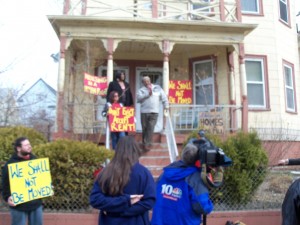 Accompanied by her children and grandchildren, Lilia Abbatematteo protested the Federal National Mortgage Agency’s (Fannie Mae) attempt to evict them from their home on Chapin Ave. in Providence.
Accompanied by her children and grandchildren, Lilia Abbatematteo protested the Federal National Mortgage Agency’s (Fannie Mae) attempt to evict them from their home on Chapin Ave. in Providence.
When her mother, Maria Amaral, passed away, Ms. Abbatematteo inherited the house in which she’d lived for the past 40 years, along with the mortgage, at the time owned by Chase Bank. Despite many efforts to modify the loan and make affordable payments, Chase insisted they could not communicate with Ms. Abbatematteo about permanently modifying the loan. The bank was, however, willing to take three trial modification payments from Ms. Abbatematteo after she hired a private attorney to advocate on her behalf.
In search of support the week before the foreclosure auction in September 2013, Ms. Abbatematteo responded to outreach from the Tenant and Homeowner Association (THA), a committee of DARE (Direct Action for Rights and Equality), a 27-year old social justice organization based in South Providence. The THA, made up of owners and tenants who have faced foreclosure and eviction, agreed to support Ms. Abbatematteo and organized an auction protest. The protest successfully deterred private investors, in search of quick profit, from purchasing the home, though it changed hands from Chase Bank to Fannie Mae.
When Fannie Mae’s representative approached Ms. Abbatematteo, she told them that she, along with the tenants renting the third floor, would like to stay and pay rent. Fannie Mae has a program called “Tenant-in-Place,” by which the quasi-governmental agency maintains renters in its REO (foreclosed) properties. Ms. Abbatematteo applied to rent from Fannie under this program, which was offered to her by Fannie’s real estate representative. By the end of the year, however, no answer was forthcoming. Fannie recently began eviction proceedings against Ms. Abbatematteo and her tenants, without a formal response to their request for “tenant-in-place.”
“We wouldn’t be in this place if Chase had worked with me before the foreclosure. We wouldn’t be in a position where two families were facing homelessness, and this neighborhood was going to be burdened with another foreclosed and abandoned property like the one down the street,” explained Ms. Abbatematteo.
Two dozen people arrived at 129-131 Chapin Ave. at 10:00 am Wednesday morning. The protesters carried signs reading, “Housing is a Human Right,” and “Don’t Evict, Negotiate!” Ms. Abbatematteo addressed the crowd using a bullhorn. She explained why the house was important to her and her family. “This house is where I was raised. My children were raised here and my grandchildren are being raised here. My granddaughter says, ‘I don’t want to move.’ This is heart-wrenching. My work commute is only around seven minutes. I like my neighbors and I love it here. I’ve lived here for forty years.”
DARE member and leader in the THA Malchus Mills deplored the devastation being caused by the foreclosure crisis in Providence and RI, citing a Fannie Mae foreclosure around the corner at 198 Althea Street, which was foreclosed in 2011 and recently burned down. The organization plans to continue to protest Fannie’s attempts to evict these families, encouraging the crowd to return and protest if an eviction order is granted in court.
]]>DARE – Direct Action for Rights and Equality – along with Lilia’s friends and neighbors, won’t let an agency, technically owned by the government, funded with our tax dollars, and that makes billions in profits, evict one of our community members!
Please sign the national petition to demand that FHFA director Mel Watt call off the eviction of Lilia and offer her an option to rent until she is able to purchase the home back at current value!
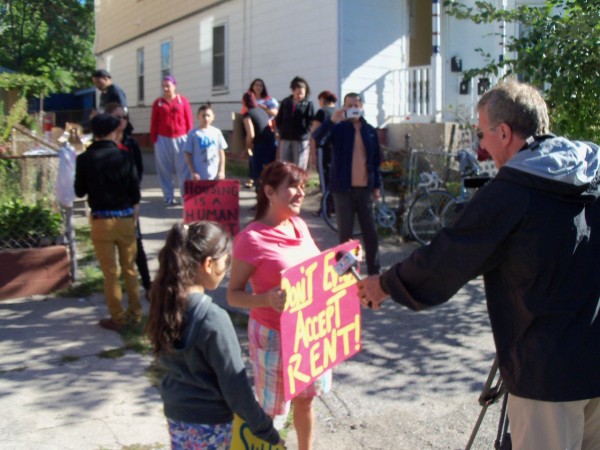
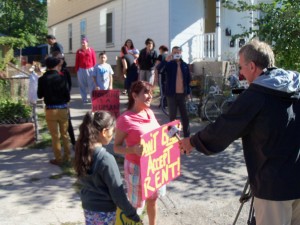
Back in December, I attended a Fannie Mae event hosted at the Rhode Island Coalition for the Homeless. I attended this event because on September 6th 2013 my house was foreclosed on and Fannie Mae became the owner of the home I have lived in for over 40 years.
On the date of my auction, my friends and supporters from Direct Action for Rights & Equality (DARE) and the Tenant and Homeowner Association (THA) helped me protest the auction, and we informed all three potential investors who showed up that day that it would be a bad idea to buy the property because it would mean displacing residents (my family) who want to stay and get the home back. On the day of the protest, this felt like a victory, but since then, things have been really hard.
I have received letters saying that I could be evicted. The Fannie Mae event was supposed to be for people who have not yet been foreclosed on, but I decided to go anyway, to see if anyone would help me. Ever since the day of the foreclosure auction I have been worrying. What am I going to do? How can I buy my house back? What will my children be left with if we don’t have this house?
My husband and I live at 129 Chapin Avenue with our four grown children, plus our three grandchildren.
This is a house I inherited from my parents, Portuguese immigrants who came to this country and worked hard for years. My mom always worked two jobs and my father worked 12 hour days. In fact, the house was completely paid off by 1984. In 2002 I co-signed a second mortgage with my mother and her then live-in partner, to help out a troubled family member. Through the years the mortgage was transferred between various banks. It ended up with Chase Bank for a while, but my name was no longer on the loan. This was traumatizing and made it impossible to get a modification after my mother’s death. I’ve tried to resolve the issue through phone call after phone call after phone call. I’ve even paid a law firm to get help. But the bank always refused to work with me.
I’ve worked my whole life, and even when we fell behind on the mortgage, I was working. In 2008 my son-in-law decided to self-deport back to Guatemala. He made this decision because the constant stress and fear of worrying that Immigrations and Customs Enforcement (ICE) was going to come and take him away was too much. For this reason, my daughter and her kids moved back in with us. At the same time, in 2008 I took at 7% pay cut at work, and have not seen a pay raise in seven years. These changes combined really started to strain our budget and that’s why we fell behind on our mortgage.
My next-door neighbor (also a member of DARE and the THA) came along with me to the Fannie Mae event last week for support. We drove to Pawtucket and found a parking spot. I brought with me a letter I wrote asking that Fannie Mae look into the possibility of selling the home back to me. We walked into the brick building and went to the second floor where Fannie Mae apparently has an office – I had no idea!
It seemed like we were the first ones there, at 9 am on the dot. Someone asked us to fill out some initial paperwork, and told us someone would be with us shortly. A woman named Kate, from Fannie Mae came out and talked to us. She asked if I had ever received a “Know Your Options” package from Fannie Mae in the mail. I had not. I told her a bit of the complicated story of my house, and she said in order for Fannie Mae to investigate my case, I needed to write a narrative of all my communication with Fannie Mae and about the house, with a date, a name, and the topic of conversation when we’d talked. The trouble with this request is that I haven’t kept detailed records of all the people I’ve talked to over the past few years, especially not over the phone! I’ve made so many phone calls! In the end, I felt like Kate was trying her best to be nice to me, but I’m worried that she won’t be able to help me. When my neighbor and I left the event an hour later – we saw only one other person there!
I told my neighbor that I think the reason more people weren’t at the event is because once people think their home is up for foreclosure, it’s like the Berlin Wall goes up. It’s the end of the road. It can feel like there is no hope. Still, even though I’m skeptical that this narrative will help, I’ve done my best to write out a very detailed narrative that tells the story of my house and what’s going on with it – to the best of my ability.
Sometimes I feel like there’s no hope. My dream is that Fannie Mae will come to the table and offer me the possibility of setting up a rent-to-own scheme. My children were raised here and my grandchildren are being raised here. My granddaughter says, “I don’t want to move.” This is heart-wrenching. I like my neighborhood. From the diversity of ethnicities, to the fruit trees and grape vines planted by my father in our backyard, this home is my world. If Fannie Mae evicts us, where will we go?
]]>Certainly, the conservatives have a lot to lose in capitulating to the demands of groups like the Providence Student Union (PSU) or the organizers of the Kelly protest. Those with opposing ideas of how society ought to be must confront each other. The more dismal component of these debates and contests however, are those allegedly “progressive” voices, who, from the sidelines of any struggle, use their privileged access to the media to denounce the methods or tactics of organizers. It’s important that this debate between these progressives (and so-called “civil rights leaders”) be settled in favor of an analysis that values justice over civility, promotes the liberation of oppressed people rather than defending the “rights” of oppressors.
So much of the criticism, and in some cases, outright dismissal, of the Providence Student Union (PSU) is focused on their tactics. Caricatured as a “sideshow” and otherwise cheap political theater, the protests and actions of the group seem to be the only thing up for debate in the minds of conservatives and professed “progressives” alike. PSU’s demands to rescind the NECAP standardized test graduation requirement, along with the largely unarticulated contention their work raises – who should decide how and what Providence students learn – don’t seem worthy of consideration. Perhaps the reason we – so conveniently, it seems, for the arguments of the pundits criticizing the PSU – don’t get anywhere with so-called “education reform” is because no one with formal decision-making power actually wants to change the direction we’re heading. More testing, evaluations designed to undermine teachers’ unions, and privatization of everything, from entire schools to busing. The conclusion one is bound to draw from the focus on superficial aspects of the situation – “how” the PSU goes about making its point- is that whomever is pandering this kind of analysis must have some stake in the status quo. No argument over the PSU’s “tactics” will result in change, especially when the context in which the students struggle to find a voice is almost entirely ignored.
Many critics of the PSU would have us believe that the group’s alleged “sideshow” tactics are unnecessary, some going so far as to say they’re just looking for publicity, not even trying to address a social issue. Yet no one seems capable of articulating how these students might otherwise voice their position in regards to NECAP or any other policy of their schools for that matter. Without a proposed alternative, one is forced not only to question what stake these critics might have in keeping things the way they are, but also where the root of their angry response to the Unions “tactics” truly lies. I would argue this ugly root is actually shaped by bigotry based on age, race, and class.
Coupled with a general fear of change (along with the power and paychecks involved) there is a deep undercurrent of hackneyed prejudice to the majority of the criticisms of the PSU. One could imagine, based on her crude comments, that Board of Education chair Mancuso doesn’t believe any 16 year old should have a say in her own education. I suppose she’d rather decide for students, in private meetings, what and how they will learn (and subsequently, how they’ll be valued as workers and adults). In Mancuso’s myopic, white-washed world, perhaps this is enough to try and wrap her mind around. But, because the PSU is based in Providence, because its members are mostly African-American, Latino, South East Asian, because many come from immigrant families, there is a lot more than the chair’s distaste for kids at stake. Though banal arguments about “tactics” obscure (intentionally in most cases), the fact that racism and class privilege are undeniably present in this situation, anyone savvy enough to understand the history and political-economy of public education in this country should not be duped.
Context matters. It matters in any debate over the Union’s demands, and it matters in one-dimensional diatribes about “tactics.” The real questions we ought to be asking ourselves are: should the students of the PSU (and students in general) have a say in how and what they learn? Who and why might someone argue that they shouldn’t? Why would the PSU employ the “tactics” they have? What other options were and are available to them? These questions, unlike the ones being posed in the majority of commentary, might get us closer to the issues underlying the work of the PSU and the roots of the arguments against them.
Based upon the response from policy-makers, school administrators, conservative and progressive commentators, it would seem that no one criticizing the PSU actually believes students (or perhaps these students) should have a voice in their own education. One of the fundamental beliefs that the PSU’s protests challenge is that administrators, far-removed policy hacks, and, increasingly, profit-seeking education corporations and their consultants, ought to decide how and what students learn.
By organizing – a concept it appears few still understand – the students of the Union are part of a long, dynamic history of how change happens in this country. One of the most prominent examples, the gains of which many PSU critics implicitly or even explicitly in some cases, work to roll back, is the Civil Rights Movement. The foundation of that widespread movement for racial justice was organizing, not the idolatry of Martin Luther King – which many of the Union’s “progressive” critics stake their reputations upon. That foundation was laid by the localized, person-to-person work being done, largely uncelebrated, by Black women in the South. Organizing, against the Jim Crow of the mid-20th century American South, or the current Jim Crow system of mass incarceration, police terror, and yes, a deeply racist education system, means opening the moral, political, and physical space for the oppressed to challenge the system of white supremacy and class domination that day-to-day largely tramples on unhindered.
The direction, militancy, and horizons of the Civil Rights Movement came from those without recognized political power, whose dreams of a different life, fueled by their daily experience of white supremacy, made them uncompromising in their struggle for justice and perhaps even revolution. These “common” visionaries, often pushed the limitations of their alleged leaders, driving the movement on to it’s next important strides towards a racially just society. Those who would seek to denounce the students of the PSU, and thus make crucial decisions for them, rather than with them, would do well to take lessons from history. Again, where do these detractor’s ideas about who should run the public education system derive from? From the brutal, white supremacist and capitalist status-quo. They aren’t doing themselves, or any of us for that matter, any favors by seeking to suppress the liberating energies of the Union’s student organizers. They are, as usual, simply lining their own, as well as the usual suspects, never-ending pockets. All in the name of “progressivism,” or even, “civil rights!”
It should be no surprise that the same antagonists who have been moralizing the PSU’s tactics would apply their reactionary logic to the recent protest of New York City police commissioner Ray Kelly. In the alleged defense of free speech, self-proclaimed civil rights leaders (along with, thanks to the Providence Journal, conservative think-tanks) have admonished the student and community organizers who prevented Kelly from speaking at Brown University. That Kelly was heckled off the stage is being called an “uncivil” disruption of his right to speak and the audience’s right to hear him. These detractors claim that the protestor’s would have been better off engaging in “civil discourse,” held up as the backbone of any progressive change.
Two related points need to be made about Kelly’s “rights,” as well as this vague and much-touted concept, civil discourse. Firstly, since when did rights have nothing to do with power? What tradition of civil rights are these alleged spokespeople upholding? Kelly, wielding his control over the policies and practices of the entire New York City police department, has established a system of race-based oppression, intended to generate fear in the people of color of New York. This is the institutionalized, highly-resourced, and undemocratic (he was appointed, no?) power Kelly holds. In this position, he has had ample opportunity, not only to voice his opinion, but to actually put his ideas into practice!
How does Kelly’s power, and subsequently, despite what many commentators would like us to believe, the breadth of his rights, compare to that of the organizers in the crowd? The organizers had no institutional backing whatsoever, except for those small, mainly volunteer-run institutions they had built for themselves. It should be easy enough to see through the straw man about Brown’s “liberal” professors and “culture.” The self-proclaimed “liberals” being touted as the scourge of conservatism on campus are the ones deriding the protestors! It’s certainly not a liberal conspiracy to toss out someone like Kelly. I imagine that if those “unruly” protestors and their ideas were really running things at Brown, we wouldn’t have seen Ray Kelly on campus at all, let alone for a huge honorarium and in a celebratory fashion.
Moreover, these organizers and protestors were, in the majority, people of color – the targets of policies like Ray Kelly’s (which, by the way, have been the norm in Providence for years, the Providence PD simply does not have a nationally recognized, formal policy of racial profiling. They prefer to deny that profiling exists.) Whatever limited power these organizers have, Kelly’s policies are designed to undermine, using near-constant threat of harassment, violence, and incarceration. Though indignant commentators would surely gasp, it’s clear to these organizers (and to those willing to accept the actual history of this country) that Ray Kelly and his policies are buttressed by hundreds of years of colonization, chattel slavery, and systemic racism, while the protestors instead struggle to overcome these bulwarks of American society.
Are we to believe that, given this glaring imbalance of power, Kelly and the protestors would have been on a level playing field had they simply engaged in civil discourse? Asked polite, but “tough” questions at the end of the man’s speech? Wrote patient and explanatory articles in the Brown Daily Herald? What incentive then would there be for Kelly’s policies of stop-and-frisk to be put to an end, either by Kelly himself (presumably after hearing the protestors impassioned, reasoned arguments) or by public opinion (which might, heaven-forbid, empower people in New York City to resist stop-and-frisk…oh wait, that’s already happening!). How easy it is to moralize in a vacuum! How simple-minded to presume, against undeniable evidence, that there is no imbalance of power mediating our rights. Again, like arguments against the tactics of the Providence Student Union, one must ask: is this innocent ignorance, or are those making these claims protecting something, intentionally obscuring reality, admonishing those who rupture the everyday through protest, to suit their own comforts, “rights,” and privileges?
It’s a massive betrayal on the part of anyone claiming to uphold the banner of civil rights to decry protestors (mostly protestors of color!) fighting the representative of a racist police policy, without even a nod to the fact that racism or massive disparities of power and influence exist in our society. Not content to simply obfuscate the reality of race and class power, some have gone further, infantilizing people’s reaction over an “emotional issue” as a substitute for any real analysis of the situation. Surely New York’s stop-and-frisk policy and the long history of racialized terror from which it springs are worthy of more than a plaintive wail about how they must make people feel!
Perhaps this is related to the bastion of liberal problem-solving, civil discourse, which has been tossed about not only as the reason to disdain the protest of Kelly, but as an inviolable pillar of our “tolerant” society. The alleged leaders called upon to comment on the protest are, rather than championing the rights of those terrorized, locked up, and brutalized by Kelly’s policies, defending their favorite straw man: civil discourse. They would have us believe that impatient and crude activists are always assaulting this discourse and preventing real, painless change from occurring. Kelly’s speech sheds light on what this “discourse” ultimately amounts to. The argument goes that the protestors, rather than “silencing” the commissioner, should have politely heard him out, then posed their challenging, yet civil, questions during the established Q & A. The result would have been a genteel and unremarkable event. And those local policy-makers and police, who only want to fight crime more effectively, would have heard their racist views and practices reaffirmed by an exalted cop, maybe steeling them to push “proactive” policing further in Providence. The Brown undergads on the verge of tears for the display of free-speech bashing would not have had to be so traumatized!
Yet, what were the protestors after? A statement. A statement against clearly racist policies. From the initial request to cancel the lecture (and spend the honorarium somewhere more appropriate), student organizers sought a disavowal of Kelly and the type of world he represents – a world that is anything but civil. If the protest made you uncomfortable, made you fret over rights, perhaps you might imagine (if you haven’t already experienced it like so many others) a stop-and-frisk. Or, consider not just an isolated incident, a one-off of humiliation, terror, and potentially life-changing consequences, but a generalized, daily routine of surveillance and random violence – the explicit goal of Kelly’s policies. One would hope that champions of civil rights would view the depravity of institutional racism as more discomforting than the heckling of a university’s honored guest. US racism was, after all, built within the genteel, civilized society of the plantation South. Not exactly a concept that we ought to be touting.
Between the Providence Student Union’s confrontation over the future of the education system and the uncivil discourse of protesting Ray Kelly, it’s clear that comfortable, establishment liberals, like their forbears, simply will not choose sides, despite an increasingly clear war over the direction of our society. It’s moments like these that expose liberalism’s inadequacies of vision and analysis. How can you participate in the struggle for justice if you become squeamish over challenging the speech of the overseer of a racist police system? How can you envision a new society if your inviolable method of change is limited to civil discourse? Who has access to this realm of discourse? Apparently Ray Kelly was welcome, while the “rude” protestors were not. So those directly impoverished, violated, too often even murdered by the systems you and Kelly quietly debate are to sit on the sidelines, face more incarceration, deprivation, and injustice, until a civil solution is worked out by those worthy of the conference room?
It’s long been time for those shielding themselves from the obvious conflict going on by hiding behind civility to declare a side. For the oppressed may not fit your description of civility. Those on the side of the oppressed might, reasonably, take your actions to mean that you have chosen your side – that of the existing system and its elites. Perhaps, despite the fact that it will not be a civil contest, folks have chosen to fight for a fundamental revolution in society, to fight for their rights to imagine, create, and live to achieve their full human potential. To defend the rights of a man like Kelly against the bold and uncivil action of those his policies oppress is to choose Kelly’s side of history, the losing side.
So, stop trying to build careers by placating those with power and influence, stop demanding civility and start demanding justice, and decide which side you plan to fight with. I for one, will follow the leadership of those bold organizers and protestors who heckled Ray Kelly offstage. I will follow them to victory over racism and capitalism, and I will gladly be uncivil doing it.
]]>